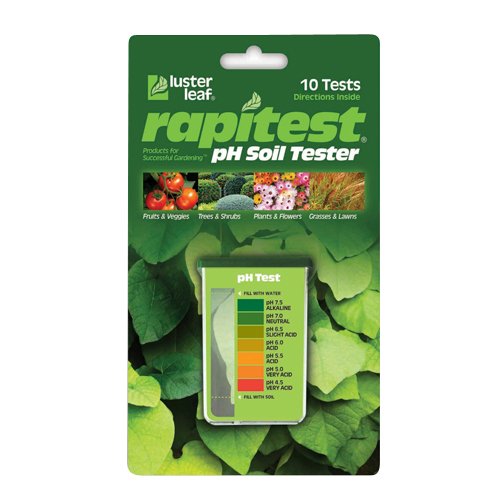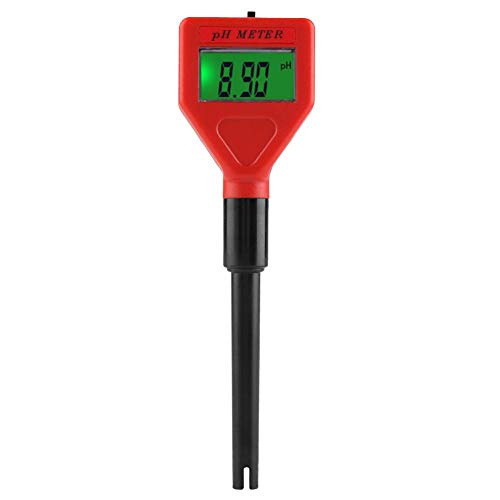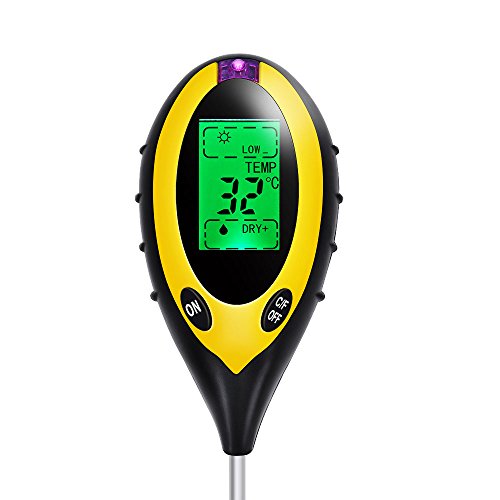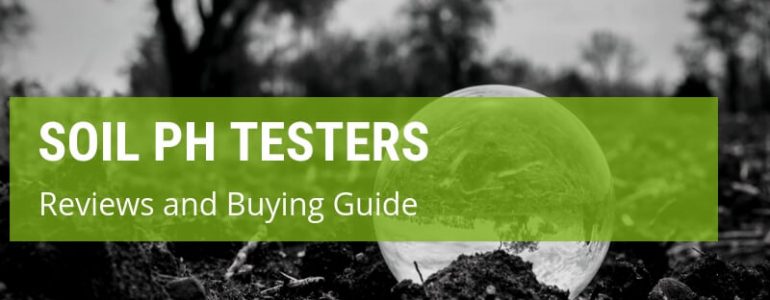Wondering where to locate your vegetable garden? Or maybe your flowers aren’t blooming as they should. In all these instances, you’ll need the best soil pH tester to know what nutrients your garden is missing.
pH testers have become a necessity for anyone dealing with live plants – both indoors and outdoors. These revolutionary devices monitor the hydrogen-ion activity in soil and display the current alkalinity or acidity level. It’s this level that is known as the soils pH.
So, why do gardeners need to know this magic number? The pH levels of your soil are essential for plants ability to take in nutrients. If not corrected early enough, a lower or higher soil pH can have damaging effects on the plants nutrition, growth, and life cycle. Testing the soil regularly will not only help identify nutrient deficiencies, it will also provide a complete assessment of your entire garden or yard.
There are different types of soil pH testers currently in the market. That’s why you need to take a few factors into consideration to get the best model for your intended purposes.
The first thing to look for is ease of use. Nobody wants to get stuck with messy chemical experiments.
Another feature to look out for is how accurate the meter is. Does is go through all the 8 available pH levels or does it skip a few numbers in between? And if there’s a probe, a long one allows for better testing.
For more advanced tests, you could pick out a pH meter with multiple measurements for moisture, temperature, and even light levels in the soil.
I have tested tested dozens of pH meters in different types of soil to find the best ones. I passed the devices though dry, damp, and wet earth and even sampled soils near dumps, factories and forests to run the scale from alkalinity to acidity. Here are the best soil pH testers designed to suit different purposes.
The Best Soil pH Tester Reviews
1. Proster Digital PH Meter
Looking for a user friendly, convenient way to check for runoff levels in liquids? The high accuracy digital pH meter from prosper offers an easy, affordable way to check the pH of soil, boiled water, purified water, fish tanks, well water, lab liquids, food processing, among others.
The Proster Digital PH Meter features an exceptionally wide measuring range of 0.00 to 14.00 which is ideal for both home and lab applications. This comes with a high accuracy rating of 0.05. Likewise, the meter incorporates an automatic calibration function and a large LCD screen to make measurements easy to read. And with low power consumption, the two 1.5 volt batteries keep working for over 500 hours.
What I like about it:
- Affordable digital pH meter
- Highly accurate measurements
- Ideal for home and laboratory use
2. Luster Leaf 1612 Rapitest pH Soil Tester

Offering gardeners quite the value for money, the 1612 Rapitest pH Soil Tester from Luster Leaf is our top economical choice for home gardens. The kit contains 10 total tests that can be used to produce simple, quick, and reliable results on different aspects of your soil. The tests are very easy to use since they also include a guide to serve as reference.
Despite being the most affordable pH tester on the list, the Luster Leaf 1612 Rapitest is also among the most versatile. In addition to measuring the pH, this kit delivers other functions including the ability to test soil for phosphorous, potassium, and nitrogen. To give users a more accurate pH reading, the tests come with the company’s patented colour comparator.
What I like about it:
- Most affordable pH tester on the List
- Multi-functional measurements for Potassium, Phosphorous, and Nitrogen
- Patented colour comparator
3. MoonCity 3-in-1 Soil Tester
Looking to be a well rounded gardener but barely have a budget to work with? At such a low price tag, the MoonCity 3-in-1 Soil Tester is practically a steal. This meter offers outstanding ease of use thanks to dual probes at the bottom which start giving measurements as soon as they are pushed in the soil.
This highly compact pH tester comes with all the multi-functionality a gardener needs to test for all necessary soil aspects. This includes the ability to test for pH, soil moisture content as well as light levels reaching your plants roots. But what makes this device unique is that there’s no need for batteries – just probe and get a reading for the selected soil aspect.
What I like about it:
- 3-in-1 functionality for light, moisture and pH
- Easy to use pointer and probe
- Affordable model with no batteries required
4. Zerodis Portable High Precision PH Meter

Light, portable, and perhaps one of the best soil pH testers that money can buy, the high precision pH meter from Zerodis is a device fit for professionals. This dual meter offers a quick, simple and accurate way to measure both the pH and moisture levels of the soil in your garden.
To achieve this, the manufacturers incorporated a waterproof metal electrode that can be used in all soil types and conditions. All you have to do is insert the probe in around 5 inches of soils and read the measurements off the large, backlit LED display. The high precision measurements are accurate within 0.2 and users will need to buy three 1.5V batteries.
What I like about it:
- Sturdy durable weatherproof construction
- Exceptionally long metal electrode for deeper probing
- High precision accuracy for professional use
5. MAOZUA 4-in-1 Soil Tester

The 4-in-1 Soil Tester from Maozua is engineered for serious gardeners who do not like leaving anything to chance. With this incredibly versatile soil sampler, users can test for everything including the pH (upto 9 levels), temperature of the soil (16 to 122 degrees F), 5 moisture levels and 9 different sunlight intensity levels.
What immediately catches your eye is the large LCD display which takes up majority of the space. The manufacturer made it larger than previous models for easy reading and included a backlit LCD display for clear visibility even in low lit conditions. But to support all these features, the 4-in-1 soil meter requires a large 9v battery not included in the purchase. The battery lasts longer now thanks to the energy saving, auto power off function.
What I like about it:
- Highly multifunctional 4-in-1 design
- Larger backlight LCD display
- Waterproof buttons for damp working conditions
Frequently Asked Questions
Q: How to use a soil pH tester?
There are different types of soil pH testing kit – you can either get the type that requires you to place soil and a chemical solution into a tube and check the colour against a given chart, or you can use a digital type.
Either way, you should take a representative soil sample from your garden – avoid areas that you have recently treated with compost, weed killer or fertiliser, so that you can get an accurate reading of your soil without added extras. It’s a sensible idea to test soil from a few different locations so you get an accurate picture of your whole garden.
For the soil sample tester kit:
Place your soil sample (having removed any stones, twigs or other large debris from your sample) into the tube you have been provided with. Add the chemical solution you have been supplied, shake the tube and wait until the soil settles. When the liquid is clear, place it against the colour chart in your pack – the colour shows the pH.
For the digital kit:
Take the first 2 inches of topsoil from various places in your garden, and mix all the samples together in a bucket. Put 2 cups of the soil samples into a clean container, and mix with enough distilled water that it is damp enough that you can firmly press it into the container. Clean the digital probe’s tip and insert it into the soil, turning it around as you do so. Make sure it has good contact with the soil, and keep it away from the bottom of the container. Sit the probe in the soil for at least 60 seconds, but read the manufacturer instructions to be certain of the allotted time.
With either testing method, note the reading – 7.0 is a neutral PH, with numbers below this being acidic, and anything higher being considered alkaline.
Q: How do you calibrate a soil pH meter?
The first step is to turn your meter on and leave it to warm up; usually around 30 minutes, but check the operator’s manual for more definitive instructions.
- Clean the electrode with distilled water in a clean beaker. Dry it with a wipe, but avoid rubbing it as this will affect the membrane that covers it.
- You will need buffers for cleaning your pH meter; one being a neutral buffer with a pH of 7, one with a pH near the sample – either 4 or 9.
- Place your electrode with the 7 pH buffer and press the calibration button to begin reading. Allow the reading to stabilise by letting the electrode sit in the fluid for 1-2 minutes.
- Once the reading is stable, press the calibration button a second time.
- Rinse the electrode again, and pat it dry.
- Place the electrode into the second buffer for your sample and press the measure button to read the pH.
Q: Where to buy pH tester for soil?
A pH tester for soil can be purchased from any good gardening store, or if you live in a small town with a small selection of gardening shops, then one of the larger gardening stores will be a better bet. Failing these options, a quick search through the online shops should turn up what you are looking for.




Just starting to look soil Ph meters . Early indications from scatty internet reviews and other b.s ? / unreliable info sources suggest the ones that don’t have a calibration function to use in conjunction with buffering solution are cr#p.
Hi there. Thanks for the comprehensive list – we too have experimented with a few of these. Apologies for the commercial pitch but considering Britain’s industrial history, in some cases it may make sense to also test soil for contamination and pollution. It isn’t easy to find a service that will test and analyse soil for this, which is why we’ve launched Safe Soil UK (https://www.safesoil.co.uk/). Thank you.